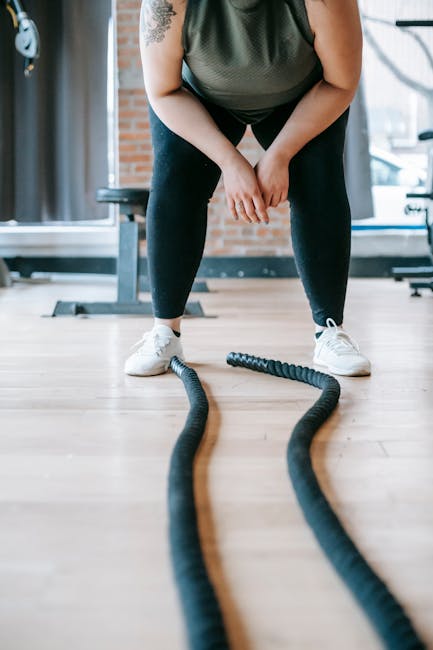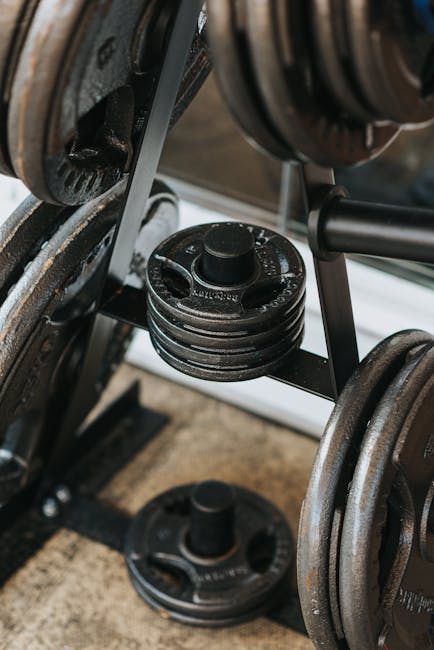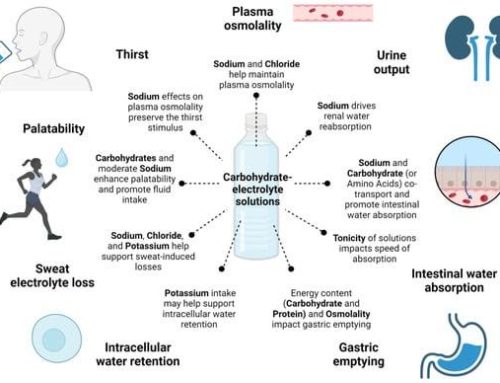Are your gains stalling faster than a car with a broken engine? Are you hitting your goals slower than a snail with a hangover? Fear not, my fellow weight-lifters, because there might be a solution to your performance problems that’s been staring you in the face all along – fasting! Yes, you read that right. Not eating food for a period of time might be the key to unlocking the best results possible in the gym. In this article, we’ll delve into the benefits of fasting for weight lifting and see if it’s worth skipping breakfast for gains that will make The Hulk jealous (okay, maybe not that much, but you get the point). So strap in and let’s get ready to fasten our way to peak performance!
Contents
- 1 1. Understanding Fasting as a Performance-Enhancing Strategy in Weight Lifting
- 2 2. The Science behind Fasting and Improved Muscle Function
- 3 3. Tips for Incorporating Intermittent Fasting into Your Weight Lifting Routine
- 4 4. Increased Power and Endurance: The Benefits of Fasting for Weight Lifting
- 5 Increased Power and Endurance: The Benefits of Fasting for Weight Lifting
- 6 5. Pre- and Post-Workout Nutrition Strategies for Optimal Performance during Fasting
- 7 Don’t Just Eat, Train and Fast Like a Beast!
1. Understanding Fasting as a Performance-Enhancing Strategy in Weight Lifting
Who knew that skipping meals could be one of the keys to lifting weights like a champ? Fasting, in its various forms, has been used for centuries as a way to improve physical and mental performance while boosting overall health.
If you’re a weight lifter looking to take your game to the next level, then consider incorporating fasting into your routine. Here’s why:
- Burns Fat: Fasting forces your body to tap into its fat stores for energy. This means you’ll burn more fat while lifting, helping you to shed those extra pounds and reveal your lean, mean muscle machine underneath.
- Increases Growth Hormone: Intermittent fasting has been shown to increase the production of human growth hormone (HGH), which is essential for building muscle mass and strength. This means you’ll see faster gains in the gym, without the use of synthetic steroids or other supplements.
But, before you start skipping meals willy-nilly, it’s important to note that fasting isn’t for everyone. If you’re new to weight lifting, or have any health conditions that may be affected by fasting, then it’s important to speak with a doctor before modifying your eating habits. For the rest of us, give it a try and see if you notice any difference on the bench press!

2. The Science behind Fasting and Improved Muscle Function
Now, let’s dive into the science behind fasting and how it can lead to improved muscle function. First off, fasting triggers a process called autophagy where your body essentially takes out the trash in your cells. This process promotes cellular renewal and helps to remove damaged cells that could be hindering muscle growth. So, by fasting, you’re basically Marie Kondo-ing your cells.
Another reason why fasting can lead to improved muscle function is because it increases growth hormone production. Growth hormone helps to build and repair muscle tissue, which is why it’s a favorite among bodybuilders. So, if you’re looking to bulk up, maybe skip the protein shake and try fasting instead.
- But wait, there’s more! Fasting also boosts insulin sensitivity, which is important for building muscle. Insulin is a hormone that helps your cells absorb nutrients, but when you’re insulin resistant, your cells don’t respond to insulin properly. By fasting, you give your cells a break from constant insulin exposure, which can help to increase their sensitivity to it.
- Plus, fasting has been shown to increase the production of a protein called brain-derived neurotrophic factor (BDNF), which is important for learning and memory. And, as we all know, gaining muscle requires both physical and mental strength, so any help in the brain department is a plus.
So, there you have it, folks. Fasting isn’t just a fad diet, it’s backed by science. And, while it may seem a bit daunting to skip meals, the potential benefits for improved muscle function make it worth considering. So, remember, when in doubt, fast it out!
3. Tips for Incorporating Intermittent Fasting into Your Weight Lifting Routine
So, you’re on a weight lifting journey, and you’ve decided to up your game by incorporating intermittent fasting. Good for you! But, where do you start? Here are some tips to get you going:
- Start Slow – Don’t dive into a 24-hour fast right away, or you’ll end up like a wilting flower – not a good look. Start with a 12-hour fast and work your way up.
- Hydrate, Hydrate, Hydrate – During your fasting period, it’s essential to stay hydrated. Drink plenty of water, black coffee or tea. Please skip the soda or anything sugary.
- Avoid Intermittent Fasting on Lift Day – If you’re lifting heavy on a particular day, try not to do intermittent fasting that day. You need fuel to build muscle and stay healthy.
Now, let’s talk about what you should be eating. Diet plays a massive role in achieving your weight loss, weight lifting goals – it’s essential to nourish your body with the right foods. But, remember, it’s not about going without; it’s about portion control and eating enough protein. Here are a few ideas:
- Eat Protein-Rich Foods – Go for lean protein sources like chicken breast, fish, eggs, or lentils. Add protein-rich snacks like Greek yogurt, almonds, or a protein shake.
- Fruits and Vegetables are Your Friends – Yes, you need to eat your fruits and veggies, and they shouldn’t feel like a chore. Make a delicious smoothie, snack on berries, and have a side of vegetables with your protein.
- Avoid Fast Food – I know it’s tempting, but that drive-thru will only set you back. If you can’t cook, try prepping your meals. Meal prep can be a lifesaver and will take away stress when it comes to food choices.
Finally, remember to listen to your body. If intermittent fasting doesn’t feel good or is affecting your mental health, it’s okay to stop or adjust. Talk to your doctor or nutritionist if you’re unsure about your dietary needs. Weight lifting and fasting can be an effective combination, but it doesn’t work for everyone, and that’s okay. Proceed with caution and give yourself grace as you navigate this new territory.
4. Increased Power and Endurance: The Benefits of Fasting for Weight Lifting
Increased Power and Endurance: The Benefits of Fasting for Weight Lifting
Fasting has become the holy grail for weight lifters who want to build muscle and increase endurance. This might sound counterintuitive, but it’s true: by restricting your calorie intake, you can actually boost your athletic performance. Here’s how.
- Burns fat: When your body is in a fasted state, it uses stored fat for energy instead of glucose. This means you can shed extra pounds, so you can move and lift more easily.
- Better recovery: During fasting, your body initiates cellular repair processes, including the removal of damaged proteins. This means that you’ll recover faster after lifting, and be ready to hit the gym again.
- HGH boost: Human Growth Hormone (HGH) is the hormone responsible for muscle growth and repair. Fasting spikes HGH levels in your body, giving you a natural boost that can enhance your lifting performance.
But let’s face it, the best part of fasting? It helps you chisel those abs! With a little willpower and a lot of hunger pangs, you can zap away the belly fat hiding your six-pack. So next time you’re feeling sluggish at the gym, consider giving fasting a try (before you schedule that pizza night, of course).
5. Pre- and Post-Workout Nutrition Strategies for Optimal Performance during Fasting
So, you’re a fasting enthusiast, right? Well, fasting doesn’t mean you can’t train anymore, but it’s essential to optimize your pre- and post-workout nutrition to perform at your best, and here are some tips to help you:
- Hydrate – Drink plenty of water before and after your workout to avoid dehydration that can lead to cramps, fatigue, and even nausea.
- Pre-Workout Meal – Eating a light meal before a workout can give you energy and prevent you from feeling weak or lightheaded during your training. Consider having fruit, nuts, or a small salad.
- Post-Workout Nutrition – After working out, it’s essential to replenish your body with protein and carbs to help your muscles recover and prevent those post-workout hunger pangs. Try to have a protein shake or a well-balanced meal within an hour after your workout.
A little disclaimer, though: I’m not a nutritionist, so don’t try to subsist on carrot juice and air alone. Your body needs fuel to keep going, so make sure you’re getting enough calories and nutrients, especially if you’re doing intense workouts.
Another thing to keep in mind is that fasting can affect your body differently, so listen to your body and adjust your nutrition plan accordingly. You might need to modify your fasting schedule or add more calories to your diet during your workout days.
So, there you have it, folks. You can still fast and crush your workouts by optimizing your pre- and post-workout nutrition. Just don’t forget to hydrate, fuel your body with the right nutrients, and listen to your body to avoid feeling like a hangry grouch. Happy fasting and training!
Don’t Just Eat, Train and Fast Like a Beast!
When it comes to weight lifting, all of us want to be the beasts that lift more, look amazing, and perform at our peak. And why not? We are in control of our bodies! However, one way to get ahead of the game that some might overlook is fasting. Yes, fasting! You can get remarkable benefits from it. Better yet, you can keep your waist size away from the “beastly” category.
Fasting can accelerate your fat loss, boost your human growth hormone, and increase your metabolism. All of these benefits seamlessly tie in with your weight lifting goals. Plus, let’s be real, lifting in a fasted state might make you resemble a wild animal with its ferociousness. Just remember friends; modesty and safety are key for lifting.
However, before jumping into a fast, be sure to talk with a professional. Not everyone’s health can tolerate it. Aside from that, embrace your inner beast and get the most out of your weight lifting journey while looking your best!








Leave A Comment